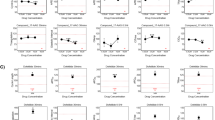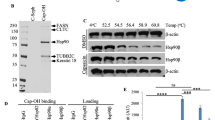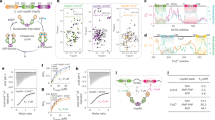Abstract
NF-κB-inducing kinase (NIK) is required for NF-κB activation based on the processing of NF-κB2 p100. Here we report a novel mechanism of NIK regulation involving the chaperone 90 kDa heat shock protein (Hsp90) and autophagy. Functional inhibition of Hsp90 by the anti-tumor agent geldanamycin (GA) efficiently disrupts its interaction with NIK, resulting in NIK degradation and subsequent blockage of p100 processing. Surprisingly, GA-induced NIK degradation is mediated by autophagy, but largely independent of the ubiquitin-proteasome system. Hsp90 seems to be specifically involved in the folding/stabilization of NIK protein, because GA inhibition does not affect NIK mRNA transcription and translation. Furthermore, Hsp90 is not required for NIK-mediated recruitment of the α subunit of IκB kinase to p100, a key step in induction of p100 processing. These findings define an alternative mechanism for Hsp90 client degradation and identify a novel function of autophagy in NF-κB regulation. These findings also suggest a new therapeutic strategy for diseases associated with p100 processing.
Similar content being viewed by others
Log in or create a free account to read this content
Gain free access to this article, as well as selected content from this journal and more on nature.com
or
Abbreviations
- (AICAR):
-
5-aminoimidazole-4-carboxamide 1-b-D-ribofuranoside
- (BAFF):
-
B-cell activating factor
- (CD40L):
-
CD40 ligand
- (GA):
-
geldanamycin
- (Hsp90):
-
90 kDa heat shock protein
- (IKK):
-
IκB kinase
- (IKKα):
-
αsubunit of IκB kinase
- (LTβ):
-
lymphotoxin beta
- (NIK):
-
NF-κB-inducing kinase
- (TRAF3):
-
tumor necrosis factor receptor-associated factor 3
References
Sun SC, Xiao G . Deregulation of NF-κB and its upstream kinases in cancer. Cancer Metastasis Rev 2003; 22: 405–422.
Xiao G, Rabson A, Young W, Qing G, Qu Z . Alternative pathways of NF-κB activation: a double-edged sword in health and disease. Cytokine Growth Factor Rev 2006; 17: 281–293.
Qing G, Qu Z, Xiao G . Endoproteolytic processing of C-terminally truncated NF-κB2 precursors at κB-containing promoters. Proc Natl Acad Sci USA 2007; 104: 5324–5329.
Mercurio F, DiDonato JA, Rosette C, Karin M . p105 and p98 precursor proteins play an active role in NF-κB-mediated signal transduction. Genes Dev 1993; 8: 705–718.
Senftleben U, Cao Y, Xiao G, et al. Activation by IKKα of a second, evolutionary conserved, NF-κB signaling pathway. Science 2001; 293: 1495–1499.
Xiao G, Harhaj EW, Sun SC . NF-κB-inducing kinase regulates the processing of NF-κB2 p100. Mol Cell 2001; 8: 401–409.
Claudio E, Brown K, Park S, Wang H, Siebenlist U . BAFF-induced NEMO-independent processing of NF-κB2 in maturing B cells. Nat Immunol 2002; 3: 958–965.
Coope HJ, Atkinson PG, Huhse B, et al. CD40 regulates the processing of NF-κB2 p100 to p52. EMBO J 2002; 21: 5375–5385.
Dejardin E, Droin NM, Delhase M, et al. The lymphotoxin-β receptor induces different patterns of gene expression via two NF-κB pathways. Immunity 2002; 17: 525–535.
Kayagaki N, Yan M, Seshasayee D, et al. BAFF/BLyS receptor 3 binds the B cell survival factor BAFF ligand through a discrete surface loop and promotes processing of NF-κB2. Immunity 2002; 17: 515–524.
Liao G, Zhang M, Harhaj EW, Sun SC . Regulation of the NF-κB-inducing kinase by tumor necrosis factor receptor-associated factor 3-induced degradation. J Biol Chem 2004; 279: 26243–26250.
Qing G, Qu Z, Xiao G . Stabilization of basally translated NF-κB-inducing kinase (NIK) protein functions as a molecular switch of processing of NF-κB2 p100. J Biol Chem 2005; 280: 40578–40582.
He JQ, Zarnegar B, Oganesyan G, et al. Rescue of TRAF3-null mice by p100 NF-κB deficiency. J Exp Med 2006; 203: 2413–2418.
Xiao G, Fong A, Sun SC . Induction of p100 processing by NF-κB-inducing kinase involves docking IkB kinase alpha (IKKα) to p100 and IKKα-mediated phosphorylation. J Biol Chem 2004; 279: 30099–30105.
Fong A, Sun SC . Genetic evidence for the essential role of β-transducin repeat-containing protein in the inducible processing of NF-κB2/p100. J Biol Chem 2002; 277: 22111–22114.
Qu Z, Qing G, Rabson A, Xiao G . Tax deregulation of NF-κB2 p100 processing involves both β-TrCP-dependent and -independent mechanisms. J Biol Chem 2004; 279: 44563–44572.
Zhang H, Burrows F . Targeting multiple signal transduction pathways through inhibition of Hsp90. J Mol Med 2004; 82: 488–499.
Dai C, Whitesell L . HSP90: a rising star on the horizon of anticancer targets. Future Oncol 2005; 1: 529–540.
Xiao G . Autophagy and NF-κB: Fight for fate. Cytokine Growth Factor Rev 2007 May 6; [Epub ahead of print]
Xiao G, Sun SC . Negative regulation of the nuclear factor κB-inducing kinase by a cis-acting domain. J Biol Chem 2000; 275: 21081–21085.
Qing G, Yan P, Xiao G . Hsp90 inhibition results in autophagy-mediated proteasome-independent degradation of IκB kinase (IKK). Cell Res 2006; 16: 895–901.
Xiao G, Sun SC . Activation of IKKα and IKKβ through their fusion with HTLV-I tax protein. Oncogene 2000; 19: 5198–5203.
Qing G, Xiao G . Essential role of IκB kinase a in the constitutive processing of NF-κB2 p100. J Biol Chem 2005; 280: 9765–9768.
Basso AD, Solit DB, Chiosis G, Giri B, Tsichlis P, Rosen N . Akt forms an intracellular complex with heat shock protein 90 (Hsp90) and Cdc37 and is destabilized by inhibitors of Hsp90 function. J Biol Chem 2002; 277: 39858–39866.
Qing G, Qu Z, Xiao G . Regulation of NF-κB2 p100 processing by its cis-acting domain. J Biol Chem 2005; 280: 18–27.
Whitesell L, Mimnaugh EG, De Costa B, Myers CE, Neckers LM . Inhibition of heat shock protein HSP90-pp60v-src heteroprotein complex formation by benzoquinone ansamycins: essential role for stress proteins in oncogenic transformation. Proc Natl Acad Sci USA 1994; 91: 8324–8328.
Chowdary DR, Dermody JJ, Jha KK, Ozer HL . Accumulation of p53 in a mutant cell line defective in the ubiquitin pathway. Mol Cell Biol 1994; 14: 1997–2003.
Orlowski M, Wilk S . Ubiquitin-independent proteolytic functions of the proteasome. Arch Biochem Biophys 2003:415:1–5.
Samari HR, Seglen PO . Inhibition of hepatocytic autophagy by adenosine, aminoimidazole-4-carboxamide riboside, and N6-mercaptopurine riboside. Evidence for involvement of amp-activated protein kinase. J Biol Chem 1998; 273: 23758–23763.
Kuma A, Hatano M, Matsui M, et al. The role of autophagy during the early neonatal starvation period. Nature 2004; 432: 1032–1036.
Chen G, Cao P, Goeddel DV . TNF-induced recruitment and activation of the IKK complex require Cdc37 and Hsp90. Mol Cell 2002; 9: 401–410.
Edinger AL, Thompson CB . Defective autophagy leads to cancer. Cancer Cell 2003; 4: 442–424.
Kondo Y, Kanzawa T, Sawaya R, Kondo S . The role of autophagy in cancer development and response to therapy. Nat Rev Cancer 2005; 5: 726–734.
Levine B, Yuan J . Autophagy in cell death: an innocent convict? J Clin Invest 2005; 115:2679–2688.
Sugita T, Tanaka S, Murakami T, Miyoshi H, Ohnuki T . Immunosuppressive effects of the heat shock protein 90-binding antibiotic geldanamycin. Biochem Mol Biol Int 1999; 47: 587–595.
Lewis J, Devin A, Miller A, et al. Disruption of hsp90 function results in degradation of the death domain kinase, receptor-interacting protein (RIP), and blockage of tumor necrosis factor-induced nuclear factor-κB activation. J Biol Chem 2000; 275:10519–10526.
Acknowledgements
We thank Genhong Cheng (University of California Los Angeles) for TRAF3 null MEFs, Lori Covey (Rutgers, The State University of New Jersey) for Ramos cells, Noboru Mizushima (Tokyo Medical and Dental University Graduate School and Faculty of Medicine) for Atg5 null MEFs, Harvey L Ozer (University of Medicine and Dentistry of New Jersey) for ts20 cells, Shao-Cong Sun (Pennsylvania State Univerisity School of Medicine) for M12-NIK cells, and Warner C Greene (University of California San Francisco) for p100 construct. We also thank Arnold B Rabson (University of Medicine and Dentistry of New Jersey) for helpful suggestions and critical reading of the manuscript. This study was assisted partially by research grants from the New Jersey Commission on Cancer Research, Fifth District AHEPA Cancer Research Foundation, American Cancer Society RSG-06-066-01-MGO and USA National Institutes of Health/National Cancer Institute R01 CA116616 to G.X.
Author information
Authors and Affiliations
Corresponding author
Rights and permissions
About this article
Cite this article
Qing, G., Yan, P., Qu, Z. et al. Hsp90 regulates processing of NF-κB2 p100 involving protection of NF-κB-inducing kinase (NIK) from autophagy-mediated degradation. Cell Res 17, 520–530 (2007). https://doi.org/10.1038/cr.2007.47
Received:
Revised:
Accepted:
Published:
Issue date:
DOI: https://doi.org/10.1038/cr.2007.47
Keywords
This article is cited by
-
Autophagic reprogramming of bone marrow–derived macrophages
Immunologic Research (2023)
-
Stress-induced inflammation evoked by immunogenic cell death is blunted by the IRE1α kinase inhibitor KIRA6 through HSP60 targeting
Cell Death & Differentiation (2022)
-
Life, death, and autophagy in cancer: NF-κB turns up everywhere
Cell Death & Disease (2020)
-
Causative role of PDLIM2 epigenetic repression in lung cancer and therapeutic resistance
Nature Communications (2019)
-
Electro-Magnetic Nano-Particle Bound Beclin1 siRNA Crosses the Blood–Brain Barrier to Attenuate the Inflammatory Effects of HIV-1 Infection in Vitro
Journal of Neuroimmune Pharmacology (2017)



